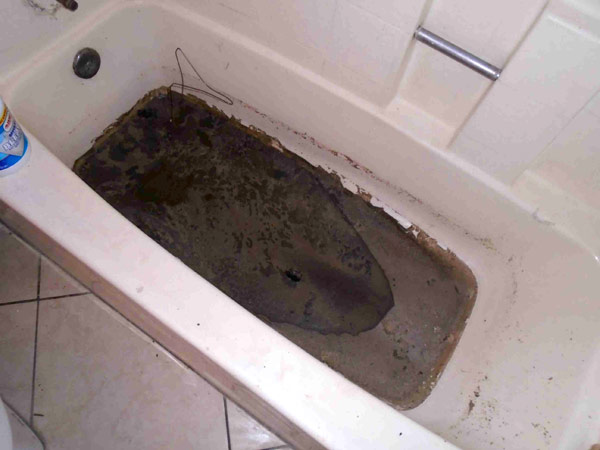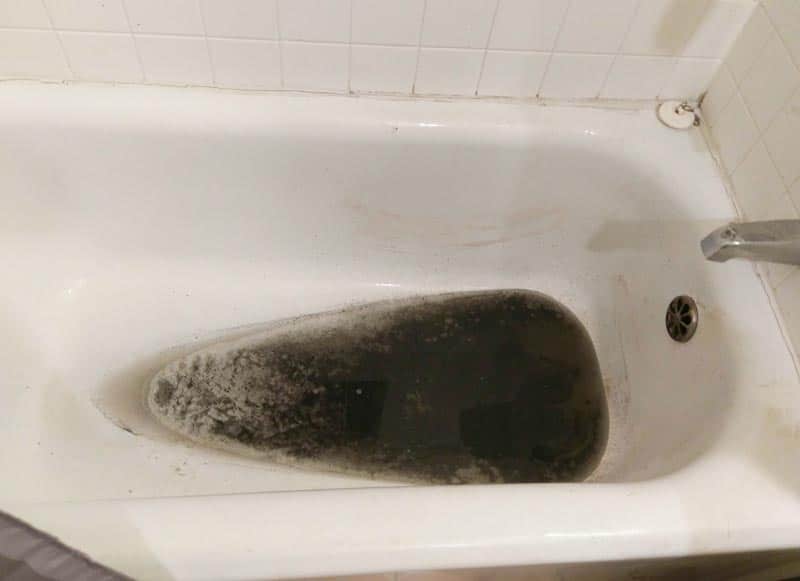Unpacking the Causes of Effluent in the Bathtub
Unpacking the Causes of Effluent in the Bathtub
Blog Article
Just about everyone seems to have their private perception in relation to Water Coming up Bathtub Drain.

Sewer back-up in the bathtub can be an upsetting and unhygienic issue for any property owner. Not only is it bothersome, yet it additionally poses serious health risks and shows underlying problems with the plumbing system. Comprehending why sewage is coming up through the bathtub is essential for taking proper activity to attend to the trouble successfully.
Intro to the Issue
Comprehending the Problem
When sewer starts backing up right into the bath tub, it's a clear indicator of a problem with the water drainage system. The wastewater that must be streaming away from your home is instead finding its back into your living space, which can bring about significant damages and health hazards.
Potential Reasons
Several variables can contribute to sewage back-up in the tub. From obstructions in the drain line to issues with the plumbing infrastructure, identifying the origin is necessary for locating an option.
Typical Factors for Sewage Back-up
Blockages in the Sewage System Line
One of one of the most common reasons for sewer back-up is an obstruction in the sewage system line. This can occur because of the build-up of debris, grease, or foreign objects in the pipes, stopping proper circulation and triggering sewer to support right into your bathtub.
Tree Origin Breach
Tree origins seeking wetness and nutrients can penetrate sewage system lines through small cracks or joints. Gradually, these origins can expand and broaden, triggering substantial damages to the pipelines and bring about sewer back-up problems.
Aging Facilities
Older homes may have dated plumbing systems that are extra prone to rust, fractures, and degeneration. As pipelines age, they come to be a lot more vulnerable to leaks and clogs, boosting the probability of sewer back-up incidents.
Heavy Rainfall or Flooding
During periods of heavy rainfall or flooding, the sewer system may come to be overloaded with excess water, triggering backups and overflows. This can result in sewage backing up into tubs and various other components inside the home.
Health And Wellness Threats Connected With Sewage Back-up
Contamination of Supply Of Water
Sewage backup can pollute the supply of water in your house, positioning a major health and wellness risk to you and your family. Direct exposure to infected water can result in intestinal concerns, skin infections, and other health problems.
Spread of Disease
Sewer contains damaging microorganisms, viruses, and parasites that can trigger a series of conditions, consisting of hepatitis, cholera, and gastroenteritis. Entering contact with sewage or contaminated surface areas puts you in jeopardy of infection.
Mold and mildew Development
Moisture from sewage backup can produce optimal problems for mold development in your home. Mold and mildew spores can aggravate respiratory system issues and trigger allergic reactions in sensitive individuals, making timely clean-up important.
Signs of Sewer Backup
Foul Odors
Unpleasant smells rising from drains or components, particularly in the shower room, may suggest sewer backup problems. These odors are often solid and persistent, signaling a problem that needs instant interest.
Slow Draining Fixtures
Tubs, sinks, and bathrooms that drain slowly or not in any way could be experiencing sewage back-up. If numerous components are impacted concurrently, it's most likely that the concern stems from a typical factor, such as the main sewer line.
Gurgling Sounds
Unusual gurgling or gurgling noises coming from drains when water is running in other places in the house are indicative of air trapped in the plumbing system. This air build-up can arise from sewage backup and must be examined quickly.
Immediate Actions to Take
Switching Off Supply Of Water
In the event of sewer back-up, it's essential to switch off the water supply to prevent more contamination and damages. Situate the major water shutoff valve in your house and closed it off until the concern can be dealt with.
Calling a Specialist Plumber
Dealing with sewer back-up is not a do it yourself job. Contact a qualified plumber with experience in taking care of sewage-related concerns to examine the scenario and perform essential repair work or clean-ups.
Staying Clear Of Contact with Polluted Water
Up until the sewage backup is settled, stay clear of contact with polluted water to prevent the spread of bacteria and virus. Use safety equipment if you should remain in the afflicted location and clean your hands completely afterward.
Preventive Measures
Regular Upkeep of Sewage System Lines
Set up normal evaluations and upkeep of your sewer lines to recognize and attend to potential issues before they intensify into major problems. This can include cleaning out debris, evaluating for tree origin breach, and repairing any broken pipes.
Mounting Backwater Shutoffs
Take into consideration installing bayou valves in your plumbing system to avoid sewer from receding right into your home throughout periods of heavy rainfall or flooding. These shutoffs automatically close when water starts backing up, securing your home from contamination.
Correct Disposal of House Waste
Avoid flushing anything other than toilet paper and human waste down the commode to stop obstructions and obstructions in the drain line. Dispose of grease, oil, and various other household chemicals properly to reduce the danger of plumbing problems.
Cleaning Up After Sewer Back-up
Disinfection Procedures
Extensively disinfect and disinfect impacted locations after sewage back-up to remove unsafe bacteria and prevent mold development. Use suitable cleaning products and protective gear to ensure risk-free and reliable cleanup.
Remediation of Affected Locations
Repair any damages to flooring, wall surfaces, or components caused by sewage back-up. Relying on the level of the damage, you might need to replace carpeting, drywall, or various other materials to restore your home to its pre-loss condition.
Why is There Sewage Coming Up Through the Bathtub
Sewage in your bathtub is a major problem that can make you want to abandon the bathroom for good. You don’t have to. However, it is important to identify the source of the issue and take the necessary steps to resolve it in order to avoid any health risks and property damage. In this article, we will discuss what could be causing sewage to back up through your bathtub so you can take action quickly and effectively.
The Main Reason For Sewage Backup in The Bathtub
All the sinks and toilets in your home connect to different pipes that lead to the main sewer line. The sewer line then connects to the municipal sewer system. This connection works seamlessly on a daily basis, but there can sometimes be a problem with the main sewer line.
The most common cause of sewage backup is a clogged or blocked main sewer line. The main sewer line can be clogged due to the accumulation of debris, tree roots or grease buildup, or other materials. Another possible cause is a collapsed pipe. When this happens, your toilets and sinks won’t be able to drain properly. This is when sewage starts backing up through the bathtub. If the problem has been occurring for some time now, it might be time to consult with a plumber as there may be more severe damage that needs fixing.
How Can You Tell if it’s Coming From Your Sewer Line?
If you’re experiencing a sewage backup in your bathtub, then you can use a few simple methods to determine if it is coming from the main sewer line. First, try to unclog the tub drain with a plunger or an auger and see if that helps. If not, then inspect all of the drains in your house and check if there is any blockage in them. If some of the other drains are not working fine, then it’s likely the problem is with your main sewer line.
Common Signs of a Clogged Main Sewer Line
If you suspect that your main sewer line is blocked, then there are a few common signs to look out for. Frequent clogs in your home are a sure sign of a clogged sewer line. You can also check for slow drainage from all the plumbing fixtures.
Slow Drains
If you notice that it takes longer for your sinks and toilets to drain, then this could be a sign of a clogged main sewer line.
Frequent Clogs
Another common sign is that your drains or toilets become clogged almost all of the time. If this happens, then it could be a sign that the main sewer line is blocked.
Water Backup
Do you notice water or sewage coming back up from any of the drains in your home? If your answer is yes, you may have a clogged main sewer line.
Sinkholes
If you’ve noticed sinkholes in your yard or overflowing sewage from the ground, you may be facing a blocked sewer line issue.
Your Shower or Sink Makes Gurgling Noises
Have you noticed gurgling noises coming from your sink or shower lately? These are typically signs of a blocked sewer line and should be checked out immediately.
How to Prevent a Main Sewer Line Clog
Once you’ve identified that your main sewer line is clogged, it’s important to take steps to prevent it from happening again. The best way to do this is to avoid putting any solid material that can clog the drain, such as grease and other debris. You should also be mindful of what you flush down your toilet. In addition, you should schedule regular maintenance for your main sewer line. This will help keep it clear and free from clogs or backups.
What Should You do if You Notice Sewage Backing up Through The Bathtub?
If you’ve noticed sewage backing up through the bathtub, then it is important to call a professional plumber immediately. A plumber can inspect the situation and determine what the cause is, such as a blocked main sewer line. They will also be able to advise you on how best to fix the issue. In some cases, a simple drain cleaning may be all that is needed.
However, if the blockage is severe, then your plumber may need to use more advanced methods to clear the blockage.
No matter what, it is important to always call a professional plumber if you experience any kind of sewage backup. They will be able to assess the situation and provide you with a solution that is best for your home.
https://baylorinc.com/blog/why-is-there-sewage-coming-up-through-the-bathtub/

We had been shown that write-up about Water Coming up Bathtub Drain through a pal on another site. Sharing is good. One never knows, you could be doing someone a favor. Thank you so much for your time invested reading it.
Visit Page
Report this page